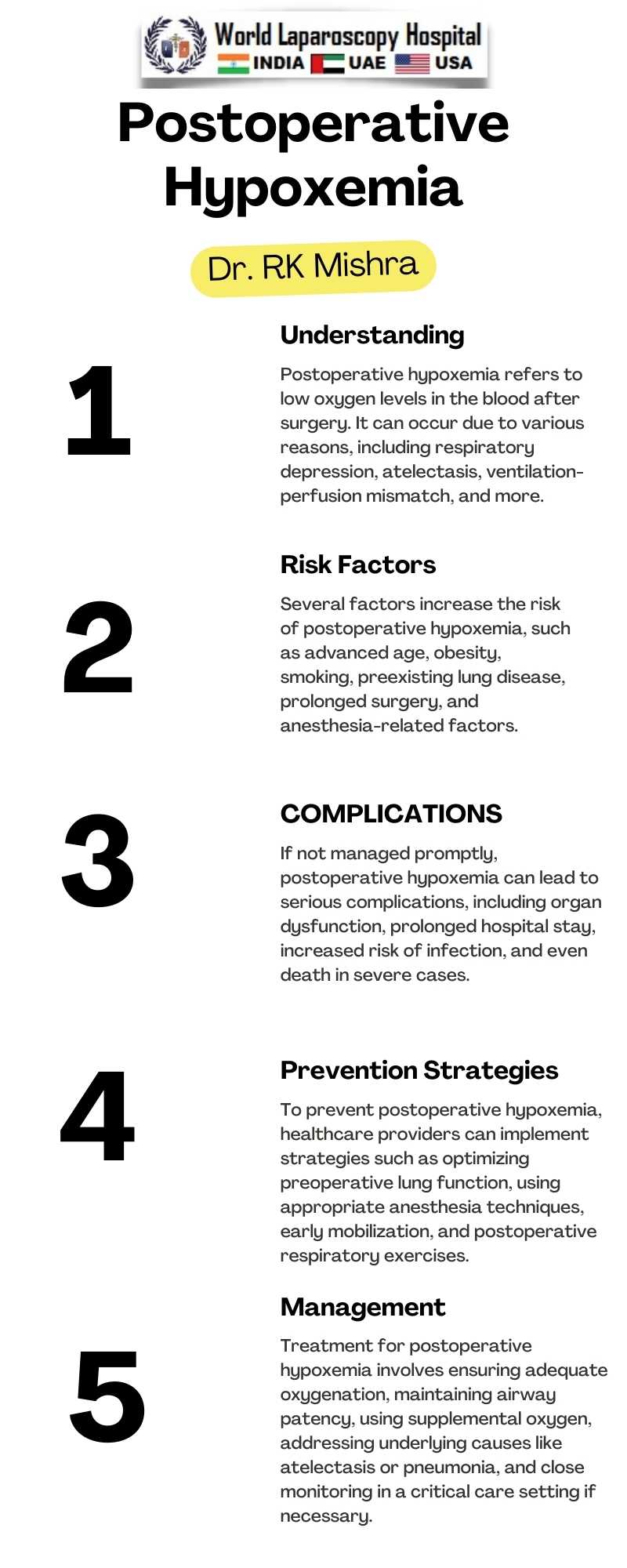Postoperative hypoxemia: Low blood oxygen levels following surgery
Postoperative Hypoxemia: Understanding and Managing Low Blood Oxygen Levels Following Surgery
Postoperative hypoxemia, the occurrence of low blood oxygen levels after surgery, is a common and potentially serious complication that can occur in patients undergoing surgical procedures. Understanding the causes, risk factors, and management strategies for postoperative hypoxemia is essential for healthcare professionals to ensure the best outcomes for their patients.

What is Postoperative Hypoxemia?
Postoperative hypoxemia refers to the condition where the oxygen levels in the blood drop below normal levels following surgery. This can occur due to a variety of reasons, including respiratory depression, impaired lung function, ventilation-perfusion mismatch, and shunting of blood away from well-ventilated areas of the lungs.
Causes and Risk Factors
Several factors can contribute to the development of postoperative hypoxemia. These include:
1. Anesthesia: The use of general anesthesia can depress respiratory drive and impair lung function, leading to decreased oxygenation.
2. Surgical Trauma: Surgical procedures can cause inflammation and injury to the lungs, affecting their ability to oxygenate blood effectively.
3. Positioning: Certain surgical positions can restrict lung expansion and ventilation, increasing the risk of hypoxemia.
4. Pre-existing Conditions: Patients with pre-existing lung disease, such as chronic obstructive pulmonary disease (COPD) or asthma, are at higher risk of developing postoperative hypoxemia.
5. Obesity: Obese patients often have reduced lung volumes and increased respiratory demands, making them more susceptible to hypoxemia.
Signs and Symptoms
Patients with postoperative hypoxemia may exhibit symptoms such as shortness of breath, rapid breathing, confusion, and cyanosis (blue discoloration of the skin). It is essential to monitor patients closely for these signs and intervene promptly to prevent complications.
Management Strategies
The management of postoperative hypoxemia involves a multi-faceted approach aimed at improving oxygenation and addressing underlying causes. Some strategies include:
1. Supplemental Oxygen: Providing supplemental oxygen can help increase oxygen levels in the blood and improve tissue oxygenation.
2. Lung Expansion Techniques: Techniques such as deep breathing exercises, incentive spirometry, and chest physiotherapy can help improve lung function and prevent atelectasis (lung collapse).
3. Positioning: Positioning the patient in a way that maximizes lung expansion and ventilation can help improve oxygenation.
4. Medications: In some cases, medications such as bronchodilators or corticosteroids may be used to improve lung function and oxygenation.
5. Monitoring: Continuous monitoring of oxygen saturation (SpO2) and arterial blood gases (ABGs) is essential to assess the effectiveness of treatment and adjust interventions as needed.
Prevention
Preventing postoperative hypoxemia involves identifying patients at risk and implementing preventive measures. This may include optimizing pre-operative lung function, avoiding prolonged periods of anesthesia, and early mobilization post-surgery.
Conclusion
Postoperative hypoxemia is a common complication of surgery that requires prompt recognition and management. By understanding the causes, risk factors, and management strategies for postoperative hypoxemia, healthcare professionals can improve outcomes and reduce the risk of complications for their patients.
Postoperative hypoxemia, the occurrence of low blood oxygen levels after surgery, is a common and potentially serious complication that can occur in patients undergoing surgical procedures. Understanding the causes, risk factors, and management strategies for postoperative hypoxemia is essential for healthcare professionals to ensure the best outcomes for their patients.

What is Postoperative Hypoxemia?
Postoperative hypoxemia refers to the condition where the oxygen levels in the blood drop below normal levels following surgery. This can occur due to a variety of reasons, including respiratory depression, impaired lung function, ventilation-perfusion mismatch, and shunting of blood away from well-ventilated areas of the lungs.
Causes and Risk Factors
Several factors can contribute to the development of postoperative hypoxemia. These include:
1. Anesthesia: The use of general anesthesia can depress respiratory drive and impair lung function, leading to decreased oxygenation.
2. Surgical Trauma: Surgical procedures can cause inflammation and injury to the lungs, affecting their ability to oxygenate blood effectively.
3. Positioning: Certain surgical positions can restrict lung expansion and ventilation, increasing the risk of hypoxemia.
4. Pre-existing Conditions: Patients with pre-existing lung disease, such as chronic obstructive pulmonary disease (COPD) or asthma, are at higher risk of developing postoperative hypoxemia.
5. Obesity: Obese patients often have reduced lung volumes and increased respiratory demands, making them more susceptible to hypoxemia.
Signs and Symptoms
Patients with postoperative hypoxemia may exhibit symptoms such as shortness of breath, rapid breathing, confusion, and cyanosis (blue discoloration of the skin). It is essential to monitor patients closely for these signs and intervene promptly to prevent complications.
Management Strategies
The management of postoperative hypoxemia involves a multi-faceted approach aimed at improving oxygenation and addressing underlying causes. Some strategies include:
1. Supplemental Oxygen: Providing supplemental oxygen can help increase oxygen levels in the blood and improve tissue oxygenation.
2. Lung Expansion Techniques: Techniques such as deep breathing exercises, incentive spirometry, and chest physiotherapy can help improve lung function and prevent atelectasis (lung collapse).
3. Positioning: Positioning the patient in a way that maximizes lung expansion and ventilation can help improve oxygenation.
4. Medications: In some cases, medications such as bronchodilators or corticosteroids may be used to improve lung function and oxygenation.
5. Monitoring: Continuous monitoring of oxygen saturation (SpO2) and arterial blood gases (ABGs) is essential to assess the effectiveness of treatment and adjust interventions as needed.
Prevention
Preventing postoperative hypoxemia involves identifying patients at risk and implementing preventive measures. This may include optimizing pre-operative lung function, avoiding prolonged periods of anesthesia, and early mobilization post-surgery.
Conclusion
Postoperative hypoxemia is a common complication of surgery that requires prompt recognition and management. By understanding the causes, risk factors, and management strategies for postoperative hypoxemia, healthcare professionals can improve outcomes and reduce the risk of complications for their patients.
1 COMMENTS
Dr. Nadeem Ahmad
#1
Feb 26th, 2024 9:37 am
Postoperative hypoxemia, a prevalent surgical complication, necessitates swift identification and care. Healthcare professionals, equipped with knowledge of its causes and management, enhance patient outcomes, mitigating complications and ensuring safer surgical experiences.
| Older Post | Home | Newer Post |

